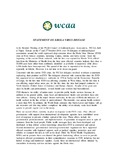| dc.description.abstract | In the Biennial Meeting of the World Council of Anthropological Associations, WCAA, held in Taipei, Taiwan on the 1st and 2nd October 2014, over 30 delegates of anthropological associations around the world expressed deep concerns about the Ebola Virus Disease (EVD) crisis in West African countries, including Guinea, Liberia and Sierra Leone. Since the beginning of the current Ebola outbreak, with the first case reported in March 2014, official data from the Ministries of Health from the three most affected countries indicate that close to 18,000 cases have either been confirmed, identified as probable or suspected, while about 6,400 deaths have been reported. The spread of the virus is reported to be slowing down, especially in Liberia. However, it is not time to let down our guard.Concerned with the current EVD crisis, the WCAA delegates resolved to release a statement explicating their position on EVD. The delegates observed with concern that since the EVD first appeared in two simultaneous outbreaks in 1976 in Sudan and the Democratic Republic of Congo, for the first time EVD was affecting countries in West Africa, for the first time it was affecting major urban areas, and, for the first time, the virus had jumped continents to North America (United States of America) and Europe (Spain). In spite of the great care taken by health care professionals, several health care workers had been infected.EVD threatens the ability of nation-states to provide public health services because, in addition to the general public, many local and international health care providers have also been affected. Among all the major disease outbreaks, in the case of Ebola the infection of health workers in the line of duty is unprecedented. The mortality rate among health workers is more than 50%. In addition, the World Bank estimates that Sierra Leone and Guinea will go into recession and that may further complicate the ability of an already weak local health system to provide urgent care to the needy.There are several efforts currently in place in response to the EVD crisis. First, affected governments with support from international development agencies have established some level of response to prevent a further spread of the virus. These efforts include the governmental pronouncements and implementation of quarantine in targeted areas in spite of resistance from the local people. Public health messages have also been developed and distributed to help deliver correct knowledge about how EVD is contracted and spread. Second, international governmental and non-governmental organizations have supported affected countries with logistical support, such as medical supplies, protective gear and vehicles to transport the sick as well as the dead. Third, the World Health Organization, WHO, and its partners have coordinated the global fundraising efforts in order to provide backup to affected governments in their comprehensive response to EVD, including but not limited to drugs and nutritional supplies. Lastly, there are international efforts initiated by researchers to develop and test vaccines against the Ebola virus.The World Council of Anthropological Associations at its Biennial Meeting underscored the important role anthropologists and other social scientists can and should play in responding to the EVD crisis. Anthropologists are uniquely placed to contribute their field knowledge and cultural expertise about the affected communities and societies. In this respect, anthropologists can offer their expert knowledge of affected communities and societies to support governments in the region, the United Nations Agencies and NGOs such as Médecins Sans Frontières, MSF, in their effort to combat the EVD crisis. Unfortunately, to date, there has been inadequate or muted response from anthropologists and social scientists in the global concerns and actions on the disease in Africa.To make our anthropological contributions to the well-being of EVD-affected communities possible and visible, the WCAA Biennial Meeting in Taipei, Taiwan hereby appeals to governments and agencies in the fight against EVD and to our peer colleagues around the world as follows: 1) Health agencies and professionals working on the EVD crisis should incorporate in their efforts anthropologists who will provide expert knowledge of local communities.2) Anthropologists should provide grounded knowledge regarding health, medicine, and community in cross-cultural contexts that may enlighten our understanding of EVD and its treatment in Africa. For instance, anthropologists should provide their field knowledge about family network ties and social structures at the local level and the potential role they play in the disease transmission patterns, management or in the delivery of information and health care.3) Anthropologists should be actively engaged in providing their expert knowledge regarding funeral rites among the affected communities and how these rites may facilitate the spread or curbing of EVD.
4) Anthropologists should provide knowledge about the potential conflicts between the government officials and the local communities in terms of needs assessment, provision of aid, delivery, and distribution, and the approach to identification and division of aid recipients.5) Anthropologists should be involved in current efforts to develop long-term solutions, such as the development of vaccines or improvement of the local health infrastructure as a way of preventing further spread of the virus and future outbreaks.
Furthermore, the WCAA stands ready to support the response of anthropologists to this crisis through the active facilitation of connections between governments and health agencies and anthropologists with relevant knowledge and expertise. The WCAA invites health agencies and professionals working on the EVD crisis to contact the WCAA Organizing Committee to this end. | en_US |

